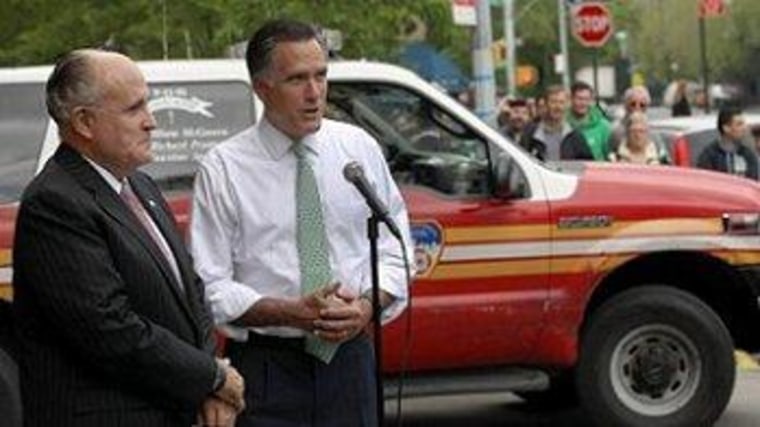Mitt Romney stopped by a Manhattan fire station on Tuesday with Rudy Giuliani -- by pure coincidence, it coincided with the anniversary of the mission that killed Osama bin Laden -- and reflected on one of the conversations he had with a firefighter.
Speaking at a Ritz Carlton fundraiser in a wealthy D.C. suburb, the presumptive GOP nominee said, "I spoke with a fireman yesterday, and he has a one-bedroom apartment, and his wife is pregnant, and he can't afford a second bedroom. I asked the firefighters I was meeting with, about 15 or them, how many had had to take another job to make ends meet, and almost every one of them had."
Jon Chait picked up on the problem with Romney's rhetoric.
Well, maybe we should pay them more! Oh, wait -- Romney's position is that these fine public servants are luxuriating in excessive pay, a fact that, unlike swelling income inequality, constitutes a major source of unfairness in American life. ("We will stop the unfairness of government workers getting better pay and benefits than the taxpayers they serve," he said last week.)This is actually a policy flashpoint between the two parties. Public employment has cratered in recent years, with public sector jobs continuing to decline even as private sector jobs rebound, exerting a continued drag on the sluggish recovery. Obama's position is that the federal government ought to provide aid to state governments to rehire some of the laid-off teachers, cops, and firefighters. Republicans oppose this. Romney seems to have forgotten that the firefighters he came face-to-face with are one category of Americans whose economic pain he's supposed to be in favor of.
Exactly. Obama even devoted a huge chunk of his American Jobs Act to hiring and saving jobs for first responders, like the firefighter Romney talked to on Tuesday. Republicans killed the proposal and Romney opposed the president's plan.
The disconnect is a real problem for the former governor (who, incidentally, has a record of laying off firefighters): he wants more public-sector layoffs, as well as pay cuts for public-sector workers, but he also wants to appear sympathetic to struggling first responders who won't benefit at all from his policy agenda.
In the bigger picture, this raises an often-overlooked problem for Romney's larger pitch: his entire platform is a failure of transactional politics.
Campaign politics, especially at the national level, tends to have a definite transactional quality. A candidate will identify a group of voters and offer to make what is, in effect, a trade -- in exchange for your support in the election, the candidate will deliver a policy that will make a material difference in your life.
Indeed, this tends to shape most of a campaign's messaging. The candidate is talking to a voter whose family doesn't have health insurance? He/she gets to hear about the candidate's plan to bring that family coverage. Another voter can't afford college tuition? Or is worried about foreclosure? Or is struggling to pay for groceries? The candidate will have some kind of plan that will address the voter's needs.
"I care about your problem," the candidate is expected to say, "and I have a solution that I think will help."
But Romney's in a tough spot, because he doesn't have much of anything to trade in exchange for votes. He meets a struggling firefighter, but Romney can't promise to boost salaries for first responders, because the his platform calls for the opposite. He meets struggling college students worried about tuition costs, but Romney can't promise more Pell Grants or expanded access to student loans, because he fully intends to end the federal government's role in helping young people afford higher education.
Team Romney organized a conference call this week to address veterans' issues, but the campaign spokespersons didn't mention any specifics about programs that might make a positive difference in veterans' lives because there were no specifics to offer.
Romney makes frequent references to the "issues that matter," but what he tends to overlook is the fact much of the American mainstream is looking for measures that will help their families -- with education, with health care, with the threat of foreclosure, etc. -- and the GOP candidate has nothing compelling to tell them.
His is an agenda of austerity, a sharp reduction in public investments, and hostility towards government activism in general. In a transactional sense, Romney has to hope most voters aren't looking to make a traditional electoral trade, because he doesn't intend to give them anything.
